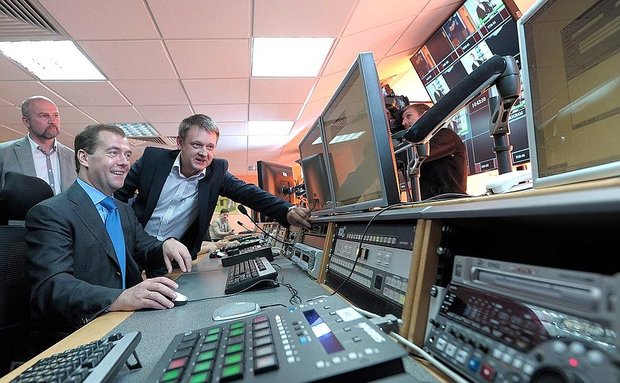Not weapon of 'information warfare' but bona fide journalism
A professional Russia watcher is speaking in defence of Russian media
The West often accuses Russian media of being biased. A week ago, the EU Parliament even passed a resolution in defence of European values against 'information warfare' from Moscow. But Gilbert Doctorow, PhD in Russian history and professional Russia watcher, considers that, for example, Russian coverage of events in the Donbass was more multisided and free than coverage in the U.S.
On 23 November, the European Parliament passed a resolution calling 'to counter disinformation campaigns and propaganda from countries, such as Russia'. It is stated that 'the Russian government is employing a wide range of tools and instruments', such as 'multilingual TV stations (e.g. Russia Today)', 'pseudo-news agencies and multimedia services (e.g. Sputnik)', 'social media and internet trolls, to challenge democratic values, divide Europe'. Meanwhile, Gilbert Doctorowhas an alternative point of view. In his article on Consortiumnews.com, he claims that the West is demonising Russian media.
To prove his opinion, Doctorow refers to numerous political talk shows, which are extremely popular on Russian television. While visiting these shows first as a spectator and then as a participant, he observed the nearly permanent presence of domestic opposition figures as well as of foreigners who could present views on the political topic of the day's discussion at sharp variance with the Kremlin line. The politicians acting as panellists come not just from the ruling United Russia but from all the Duma parties, including frequent appearances by the Liberals of the Yabloko party, which hasn't gained the minimum 5 percent threshold for Duma representation since 1999.

The author states there is a significant difference between Russian political shows on the degree to which they are 'scripted' by their management. Perhaps the most scripted is 'Sixty Minutes' at Rossiya 1, in which presenters Yevgeni Popov and Olga Skabeyeva are using teleprompters and the audience applause is aggressively prompted.
Doctorow also describes some particularities of Russian television. Most of political talk shows on Russian TV are an evening phenomenon, while daytime programmes usually focus on housewives' concerns. However, there is a daily two-hour political talk show 'Time Will Tell' on Channel One Russia in mid-afternoon. The target audience of this show consists of stay-at-home women and viewers aged 50 and above, so there are some production differences. First of all, the vocabulary of panellists should be free of political terms and allusion to littleknown names or philosophies. Besides, overly calm discussions are not welcomed. The presenter of the show Artyom Sheinin believes that his audience sitting at home at midday needs 'an adrenaline shot', so the manner of Russian panellists to shout down one another is not discouraged in the way it is on evening programming.
The watcher says that studio design and presentation formats of Russian TV shows copy each other as well as American television. As a result, when you turn on any of the political talk shows, you see rather similar studios with live audiences. The format of having male-female pairs as hosts is also a widespread practice.
The author also notes that all the major political shows on the three channels he observed from inside use many of the same panellists. Any programme can change its content (and, thus, the list of invited persons) at the last minute in case of breaking news. This favours inviting panellists from the Moscow area because they can be invited and disinvited at short notice.